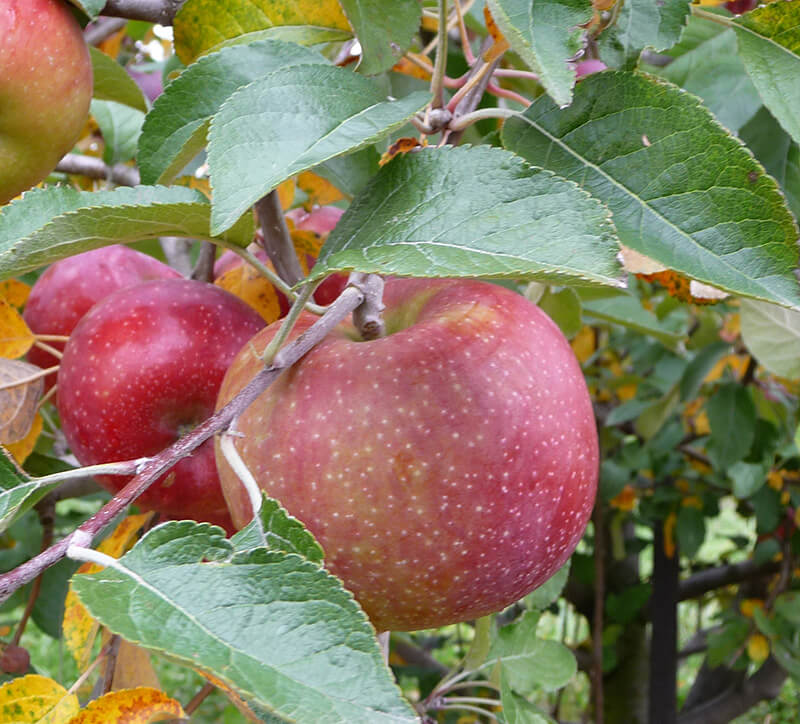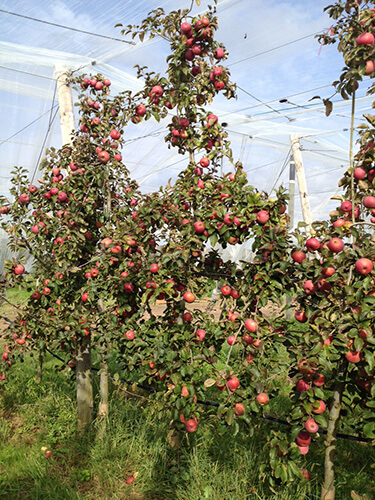November 21, 2017
Purdue-affiliated apple gaining popularity for organic production in France

French company Benoit Escande Editions SARL has obtained worldwide exclusive rights to Juliet, a Purdue-affiliated apple gaining popularity for organic production. The apple is a product of a cooperative involving Purdue University, Rutgers University and the University of Illinois. The Juliet is popular because of its disease resistance and long storage life. (Photo provided)
WEST LAFAYETTE, Ind. – A French company has obtained worldwide exclusive rights to Juliet, a Purdue-affiliated apple gaining popularity for organic production.
Benoit Escande Editions SARL has obtained exclusive rights to the Juliet apple, a product of a cooperative breeding program involving Purdue University, Rutgers University and the University of Illinois. The cooperative had received royalties on the tree sales as well as any merchandise sold under the name Juliet, and will now also receive royalties on the fruit.
“The Juliet apple is popular among organic growers because of its many good qualities, such as disease-resistance, lack of premature fruit drop, long storage life and smooth, shiny skin with crisp texture,” said Jules Janick, the James Troop Distinguished Professor of Horticulture at Purdue University. “It is a remarkable apple.”
The Juliet is a “club” apple, which means it is trademarked and grown by a select group. The apples are grown in France by members of “Les Amis de Juliet,” or “Friends of Juliet,” and distributed throughout Europe, Asia, the Middle East and Canada. There are more than 120 Juliet growers in France.
 Juliet apples, the product of a cooperative involving Purdue University, Rutgers University and the University of Illinois, is gaining popularity in France for organic production. Benoit Escande Editions SARL has obtained exclusive rights to the Juliet apple. The apples are grown in France by members of “Les Amis de Juliet,” or “Friends of Juliet,” and distributed throughout Europe, Asia, the Middle East and Canada. (Photo provided)
Download image
Juliet apples, the product of a cooperative involving Purdue University, Rutgers University and the University of Illinois, is gaining popularity in France for organic production. Benoit Escande Editions SARL has obtained exclusive rights to the Juliet apple. The apples are grown in France by members of “Les Amis de Juliet,” or “Friends of Juliet,” and distributed throughout Europe, Asia, the Middle East and Canada. (Photo provided)
Download image
“Making it a club apple is a way to limit production and maintain a fair price for growers. People growing the Juliet are having great success,” Janick said. “That popularity is a strong indication this cultivar could be promoted for organic production in the United States as well as other apple-producing countries.”
The long storage life also makes Juliet popular among growers. The lack of fruit browning is another virtue. Janick said one Canadian customer was even concerned the Juliet apples had been irradiated because of the lack of browning.
The cooperative apple breeding program involving Purdue, Rutgers and Illinois was started in 1945 to develop apples that were resistant to a serious disease called apple scab. Because the apples are scab resistant, the need for pesticide use is greatly reduced.
Eighteen apple selections have been named and licensed through Purdue’s Office of Technology Commercialization and 20 other selections are under evaluation. Among the better-known varieties are GoldRush, a long-storage yellow apple; Pixie Crunch, a medium-sized red apple; CrimsonCrisp, a midseason red apple; Enterprise, a late red apple; and WineCrisp, a crunchy, dark red apple. The cooperative continues to bring in royalties to the universities.
Jean-Louis Escande, the grandfather of Benoit Escande, spotted an apple tree, later named Juliet, being tested at Rutgers University in New Jersey and he subsequently brought it home to Saint-Vite, France, where he found it performed well . His grandson Benoit took over the nursery and conceived that it would fit organic production. It was patented in France in 2004. The scab resistance of Juliet derives from an ornamental crab apple called Malus floribunda. In addition to having a high resistance to scab disease, it also shows resistance to powdery mildew and fire blight.
About Purdue Office of Technology Commercialization
The Purdue Office of Technology Commercialization operates one of the most comprehensive technology transfer programs among leading research universities in the U.S. Services provided by this office support the economic development initiatives of Purdue University and benefit the university's academic activities. The office is managed by the Purdue Research Foundation, which received the 2016 Innovation and Economic Prosperity Universities Award for Innovation from the Association of Public and Land-grant Universities. For more information about funding and investment opportunities in startups based on a Purdue innovation, contact the Purdue Foundry at foundry@prf.org. For more information on licensing a Purdue innovation, contact the Office of Technology Commercialization at innovation@prf.org.
Purdue Research Foundation contact: Tom Coyne, 765-588-1044, tjcoyne@prf.org
Source: Jules Janick, 765-494-1329, janick@purdue.edu

